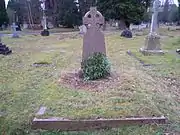Benjamin Thomas Brandreth-Gibbs
Sir Benjamin Thomas Brandreth-Gibbs (8 January 1821 – 2 June 1885) was an agriculturalist and horticulturalist who was knighted for his services to both by Queen Victoria in 1878.

Early life
Brandreth-Gibbs was born at Brompton Hall in London and baptized in 1821 in Maulden in Bedfordshire, the youngest son of horticulturalist Thomas Gibbs[1][2] who founded 'Thomas Gibbs & Co., Seedmerchants' of Half-moon Street, London. Benjamin Thomas Brandreth-Gibbs studied under the Rev Henry Smith Pollard MA and Rev M Marcus MA and was about to enter St John's College, Oxford with intention of proceeding to the Bar but suddenly decided to turn his attention to agricultural pursuits.[3]
Career

He was a Superintendent in Class 9 - agricultural machinery, one of the largest sections - at The Great Exhibition of 1851 and was a juror in the same class. He was one of the members of the Executive Committee[4] formed after The Great Exhibition to set up a Memorial to the Exhibition which was to be in the form of "a testimonial of admiration and esteem" to Prince Albert, whose statue was to be its chief feature. The idea caused some embarrassment to Prince Albert and various other schemes were considered until the death of the Prince in 1861 led to his statue being put at the centre of the Albert Memorial.[5][6]
Brandreth-Gibbs was engaged by the Board of Trade in superintending the selection of agricultural machinery for the British display at the Paris Exhibition of 1855; the display won five gold medals.[3] He was a Superintendent on the Agricultural and Horticultural Committee of the International Exhibition of 1862 when he oversaw the display of agricultural implements in the eastern uncovered annexe at The Crystal Palace.[7]
He was awarded the rank of Commander in the Order of Franz Joseph of Austria and Officer in the Legion of Honour. He was knighted by Queen Victoria at Windsor Castle on 27 November 1878 for services to horticulture.[8] He was the Honorary Director of the Royal Horticultural Society for 32 years and was president in 1884. He was a Member of the Royal Agricultural Society of England and was the Honorary Secretary of the Royal Smithfield Club for 35 years[9] and a vice-president from 1878 to his death in 1885.[10][11]
Death

Benjamin Thomas Brandreth-Gibbs died in 1885 aged 64 years at his home Moseley House in West Kensington Park in London.[1] He is buried in Brookwood Cemetery with his wife Catherine Mary (née Jackson) whom he married in 1870[12] and who died in 1937 aged 86, his daughter Catherine Alice who died in 1951 aged 78, and his infant sons Alsted (1876-1878) and Millard Brandreth-Gibbs (1880-1881). Another son was Villiers Gibbs.
References
- Benjamin Thomas Brandreth-Gibbs on the Silk Weavers and Stay Makers website
- List of the Members of the Royal Horticultural Society (1824) - Google Books p26
- The Illustrated London News - 22 December 1855 pg 726
- Monument: Great Exhibition and Prince Albert - London Remembers website
- The Memorial to the Exhibition of 1851 - British History Online
- The Memorial to the Exhibition of 1851 - Survey of London: Volume 38, South Kensington Museums Area. Originally published by London County Council, London, 1975 pgs 133-136
- The International Exhibition of 1862: The Illustrated Catalogue of the Industrial Department, Volume1: British Division, Cambridge University Press - Google Books pg 60
- Honour of knighthood on Ben Thomas Brandreth Gibbs, Esq., - The London Gazette - 27 November 1878
- Mr B. T. Brandreth-Gibbs - The Penny Illustrated Paper - Saturday 15 December 1866 p12
- The Gardeners' Chronicle and Agricultural Gazette, Part 1 (1884) - Google Books
- Sir B. T. Brandreth-Gibbs - The History of the Smithfield Club from 1798 to 1900
- Lady Catherine Mary Brandreth-Gibbs - Dod's Peerage (1923)